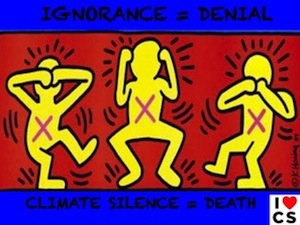Talking Turkey: A Holiday Pledge To End Climate Silence
 We think of Thanksgiving as an eating holiday. And why not? One thought of Mom’s candied sweet potatoes and my salivary glands are off to the races. But Thanksgiving is about something more, isn’t it? The average American travels nearly 600 miles for Thanksgiving and — my mom’s sweet potatoes notwithstanding — we are not traveling that far for the food.
We think of Thanksgiving as an eating holiday. And why not? One thought of Mom’s candied sweet potatoes and my salivary glands are off to the races. But Thanksgiving is about something more, isn’t it? The average American travels nearly 600 miles for Thanksgiving and — my mom’s sweet potatoes notwithstanding — we are not traveling that far for the food.We endure crowded airports and screaming kids in the backseat, so we can spend time reconnecting with family and friends. While our mouths are full some of the time, more often we are using them to share our stories from the previous months. So Thanksgiving is really a talking holiday; a time when we slow down and spend the day in conversation.
What if we spent a little of our “talking holiday” this year speaking with each other about our warming planet and what we can do about it? There’s plenty to talk about, from the scary (Sandy, the record drought in the Midwest affecting 80 percent of U.S. agricultural land) to the hopeful (America’s first major climate law coming online in California on New Year’s Day or a Motor Trend Car of the Year that for the first time doesn’t run on gasoline).
These kinds of conversations would make a big difference. Over the last two years of climate silence in America, it has largely become socially taboo to even mention this enormous growing threat to humankind. That silence was broken, at least temporarily, three weeks ago as climate disruption roared back into our public discourse in the wake of Superstorm Sandy. Suddenly, newspapers, business magazines and even politicians began to talk again about the risks we face and the solutions within our grasp, if we take practical steps to prepare.
Can we take the next step and begin to talk about global warming socially? For many, the years of not talking about climate change have left us a little out of practice and even uneasy about broaching the subject, especially in the mixed company of our holiday dinners. This uneasiness is completely understandable. And we must get over it.
Only if we quickly begin a major conversation in America about climate disruption can we give our leaders the courage to act. And what better time to launch this conversation than on America’s “talking holiday.” So I encourage you to join me in taking a Thanksgiving climate pledge: “I will talk to at least one person during Thanksgiving about my concerns around global warming and my hopes for a safer future.”
“But wait,” you say, “how do I start a conversation about climate change?” Well, if you can be certain of anything it’s that folks will talk about the weather. So how about going a little further and talked about our weirdly changing weather?
“Okay,” you say, “but I’m not a climate expert. I don’t want to get into a debate with Uncle Howard about peak oil and volcanic eruptions?” So don’t. These conversations don’t need to be scientific debates. The best advice I’ve heard is to tell your own story, explain why you are worried about a future where we fail to address climate change. Resist the impulse to debate and instead really listen to what your aunt/brother-in-law/high school friend has to say. Rather than questioning science, is she really just worried that there’s nothing we can do to about climate change? And most importantly, this isn’t about “winning” or convincing someone that you’re right. By meeting your climate conversation partner where they are and truly listening, you can begin to break down our collective anxiety around talking about global warming.
But if you’re still looking for a little confidence boost heading into that after-dinner chat with Cousin Ray, here are a few myth-busters:
• Myth: “Sure, the climate is changing, but scientists don’t agree on the cause.”
Fact: Ninety-seven percent of climate scientists agree that humans are causing global warming. The new World Bank president, medical doctor and scientist Jim Yong Jim, said recently “[a]s someone who has lived in the world of science for a long time, 97 percent is unheard-of consensus.”
• Myth: “Even if the United States reduces carbon pollution it won’t matter because other countries won’t act.”
Fact: More than 30 countries already have caps on carbon pollution or carbon taxes, including all of Europe, Australia, South Korea and South Africa. Earlier this year, Mexico enacted an ambitious climate law. Last month, China launched a cap-and-trade program in several of its provinces. The rest of the world is moving; increasingly we in the U.S. are the exception.
• Myth: “The problem is too big; there’s nothing we can do about it.”
Fact: There are so many ways we can make a difference in our homes, businesses, communities and our nation to get better prepared for climate change. And we have the technology we need today to break away from fossil fuels. Saving energy saves money — $18 trillion worth according to the International Energy Agency. We don’t need major technology breakthroughs; we need political will.
And political will follows public conversation.
So as you take the Thanksgiving Climate Pledge, know that you won’t be alone, but will be part of something much bigger. One-by-one we can create the conversations we need to move America forward to a safer and prosperous future. Let’s get started this holiday season.
You can return to the main Market News page, or press the Back button on your browser.

